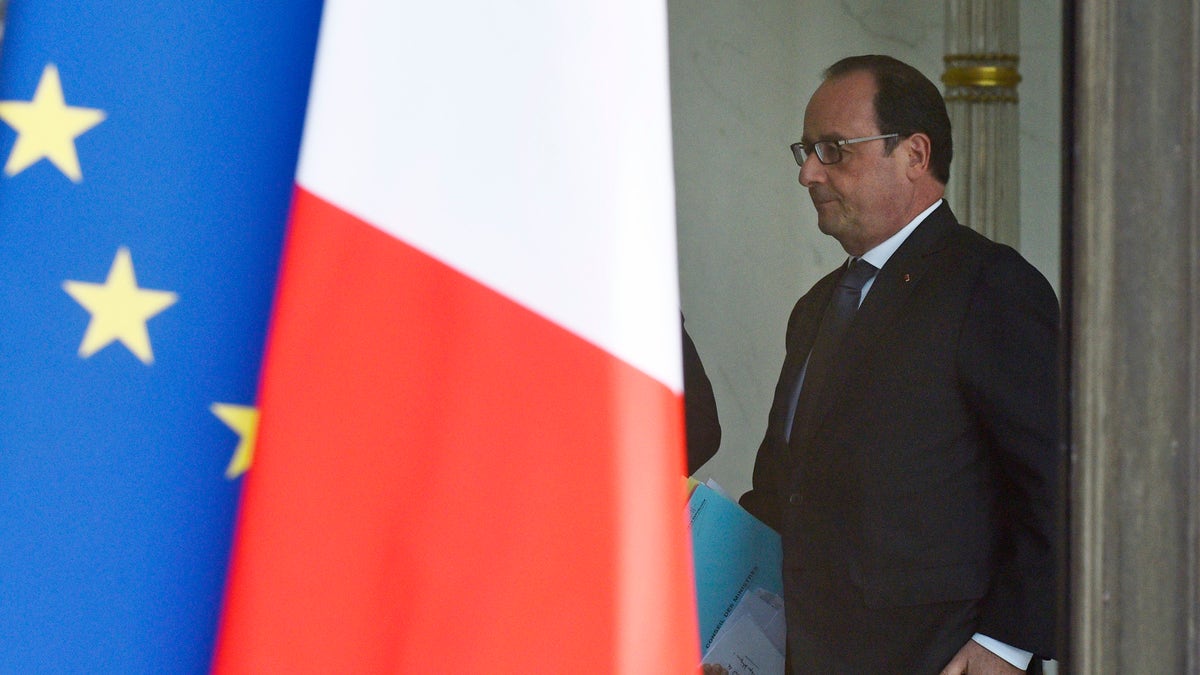
French President Francois Hollande walks through the lobby of the Elysee Palace after the weekly cabinet, Wednesday, June 24, 2015 in Paris, France. France summoned the U.S. ambassador to the Foreign Ministry on Wednesday following revelations by WikiLeaks that the U.S. National Security Agency eavesdropped on the past three French presidents. (AP Photo/Kamil Zihnioglu)
According to reports posted by arch mischief-maker WikiLeaks during the last 48 hours, France is the latest victim of U.S. espionage. The reports state that the National Security Agency spied on President Francois Hollande and his predecessors, Nicolas Sarkozy and Jacques Chirac, between 2006 and 2012.
As a former British Intelligence officer, I’m not surprised at how France has reacted. It’s done so in the way that all nations react when they catch spies operating on their turf – with mock outrage and petulance.
Hollande has called an emergency meeting of French security chiefs. He’s stated that France will "not tolerate" acts that threaten its security, and that the U.S. must promise not to spy on French leaders. French Foreign Minister Laurent Fabius has summoned U.S. Ambassador Jane Hartley to answer the WikiLeaks allegations. And a senior French intelligence official is expected to visit Washington to discuss the spying claims.
One of the 2012 files is about Hollande discussing Greece's possible exit from the Eurozone. Another one a year earlier suggests Sarkozy wanted to resume peace talks between Israel and the Palestinians, without U.S. involvement. A 2010 file claims French officials were aware that the U.S. was spying on them and intended to make a complaint.
As a former British Intelligence officer, I’m not surprised at how France has reacted. It’s done so in the way that all nations react when they catch spies operating on their turf – with mock outrage and petulance.
Whether the files are accurate or not, their disclosures highlight events that are not threats to French security. Instead, what the NSA is alleged to have done is merely to try to understand France’s policies and negotiating stances beyond its borders. This happens all the time – and not just in the spying game.
Diplomats try to glean juicy snippets of information from their foreign counterparts at embassies’ cocktail circuits; politicians engage in “off the record” chats with their opponents, each party trying to sniff out the truth of how the other intends to vote; lobbyists run sources in the media and the media runs sources right back at them. All want information that might make a difference to their objectives.
And then there is open source material. The all-pervasive Internet has made access to data a mere click away. It’s become so easy to access information that the concept of secrecy is in the wane. The question spies (and journalists, for that matter) currently have is one of their relevance. How do they add value when it’s so easy to find the truth?
But there are still secrets out there that can’t be found on the Net. Whether these secrets pertain to national issues or stories that no one has yet told, the majority of these secrets are locked inside people’s heads. And it takes other people, and sometimes their gadgets, to unlock a person’s inner thoughts.
Everyone information-gathers. It’s a natural human condition to help inform us about our surroundings, and to identify threats to our wellbeing and the wellbeing of those close to us. We want to know who our neighbors are, whether they’re pretending to be one thing when they might be something else, what really goes on in our kids’ schools, whether our wives or husbands are telling us the truth, whether our bosses intend to lay off staff, and on and on it goes.
Within that very human dynamic, should there be a rule – or rather, a raft of rules – about what is a fair and sportsmanlike way of obtaining information? Is it wrong to eavesdrop on a person’s private conversation, but OK to watch that person through binoculars? Can we make discreet inquiries about the family that’s just moved in next door, but should we feel guilty if we Google their surname to find out if they’re on the FBI’s Most Wanted list? Is it OK to listen to an indiscreet German politician recount every detail about Chancellor Angela Merkel’s private views on the European Union, but just plain bad to bug Merkel’s phone?
We may all have differing views on what are OK means of obtaining secrets, but all of us need information to survive. Nation states are no different.
I live in Britain. To my geographical right is France; to my left is America. Both are my neighbors, and I have no gripe with either. But I want to know if they’re doing something that might affect me.
To America’s right is not just Britain, but the European Union as a whole, and all of the diverse and Machiavellian agendas within. Among manifold other major EU problems, Greece is in economic meltdown, the Euro’s under threat, and Britain is seriously considering walking out. Europe is possibly on the cusp of massive change, and that change would strike the globe. The continuance or breakdown of the EU will not just affect America’s economy. It will also impinge upon alliances, politics and military security against threats such as Russia.
Spying isn’t a dirty word; it’s one of many valuable mechanisms to gain timely information. America needs to know what’s going on behind the scenes in Europe. Among other resources at its disposal, use of its NSA and CIA is a pragmatic course of action. America can’t afford to be browbeaten by hypocritical and intangible “principles” and nonexistent “gentlemen’s club rules.” Beneath the veneer of its false indignation, France understands that. After all, it spies on America.
